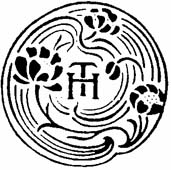It faces west, and round the back and sides
High beeches, bending, hang a veil of boughs,
And sweep against the roof. Wild honeysucks
Climb on the walls, and seem to sprout a wish
(If we may fancy wish of trees and plants)
To overtop the apple-trees hard by.
Red roses, lilacs, variegated box
Are there in plenty, and such hardy flowers
As flourish best untrained. Adjoining these
Are herbs and esculents; and further still
A field; then cottages with trees, and last,
The distant hills and sky.
Behind, the scene is wilder. Heath and furze
Are everything that seems to grow and thrive
Upon the uneven ground. A stunted thorn
Stands here and there, indeed; and from a pit
An oak uprises, springing from a seed
Dropped by some bird a hundred years ago.
In days bygone–
Long gone–my father’s mother, who is now
Blest with the blest, would take me out to walk.
At such a time I once inquired of her
How looked the spot when first she settled here.
The answer I remember. ‘Fifty years
Have passed since then, my child, and change has marked
The face of all things. Yonder garden-plots
And orchards were uncultivated slopes
O’ergrown with bramble bushes, furze and thorn:
That road a narrow path shut in by ferns,
Which, almost trees, obscured the passer-by.
Our house stood quite alone, and those tall firs
And beeches were not planted. Snakes and efts
Swarmed in the summer days, and nightly bats
Would fly about our bedrooms. Heathcroppers
Lived on the hills, and were our only friends;
So wild it was when first we settled here.’
(“Domicilium,” Hardy’s earliest known poem, describes the Hardy cottage some forty years before his birth. Reproduced from James Gibson, ed. The Complete Poems of Thomas Hardy. New York: Macmillan, 1976. 3-4.)
